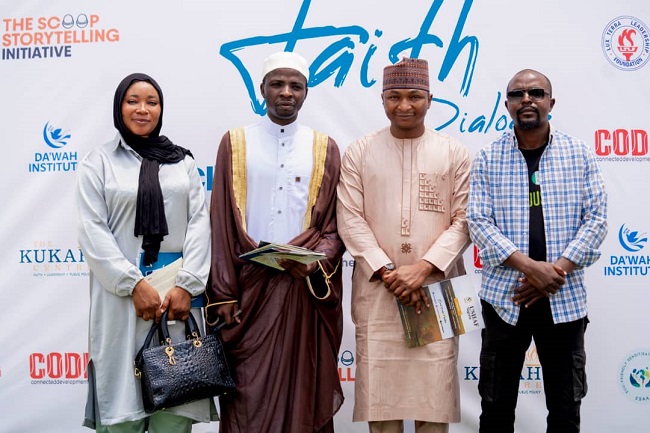Climate change remains one of the most pressing global challenges, exacerbating vulnerabilities and threatening livelihoods.

Recognising the urgent need for faith-based solutions, Connected Development (CODE) hosted the Interfaith Climate Change Summit on Thursday, March 6, 2025, in Abuja.
Dubbed “Interfaith Symposium: Harnessing Faith for Climate Action”, the summit brought together religious leaders, climate experts, policymakers, and advocacy groups to explore the role of faith in driving environmental sustainability.
Mukhtar Modibbo, Secretary General of Follow The Money, emphasised the need for faith communities to actively engage in climate discourse.
“We are all people of faith who believe in God, yet climate change affects us all—something often overlooked in religious contexts,” he remarked.
Climate communication specialist Daniel Oladoja underscored the philosophical and moral responsibility of humankind.
Citing Socratic principles, he stated, “The perfect human being is all human beings put together. Interfaith dialogue seeks to unify this wholeness in the fight against climate change.”
He urged the youth to challenge narratives that make climate action seem impossible, advocating for strategic collaboration as a force for change.
The first keynote speaker, Sheikh Muhammad Nurudeen Lemu of Dawah Institute, stressed the shared responsibility of faith leaders and communities to protect the planet.
He identified climate-induced conflicts due to deforestation, unplanned urbanisation, and resource scarcity as critical concerns.
“We must integrate faith, science, and government to drive sustainable solutions,” he said.
He urged religious leaders to use faith-based platforms for climate advocacy and to stress sustainability in sermons.
Reverend Father George Omaku Ehusani of Lux Terra Leadership Foundation delivered a compelling visual presentation on human-induced climate change, highlighting the impact of plastic pollution on marine life.
He cited research showing that over 14 million tonnes of plastic enter the ocean annually, devastating aquatic ecosystems. Calling for a renewed ethical framework, he stated, “The earth is God’s gracious gift, and we are meant to be stewards, not masters who exploit it.”
His address stressed the need for humility, solidarity, and sustainability as guiding principles in faith-driven climate advocacy.
A thought-provoking panel session, moderated by journalist Zainab Bala, featured:
Fr. Attah Barkindo, from The Kuka Centre (TKC), advocated for localised climate education, urging faith leaders to make policies more relatable for grassroots communities.
Also, Dr. Mike Terungwa, founder of the Global Initiative for Food Security and Ecosystem Preservation (GIFSEP), highlighted the influence of religious leaders in shaping public attitudes and political will toward climate policies.
Rifkatu Joseph Odeyemi of Eco-Friendly Sensitisation and Advocacy believes that there is need for increased collaboration between religious institutions and climate organisations to amplify awareness.
Key takeaways from the discussion included the necessity for faith leaders to break down complex environmental concepts using culturally relevant narratives and the power of collaboration in mobilising communities.
A highlight of the summit was the official launch of the Interfaith Dialogue on Climate Change Report, presented by Dr. Augustine Okere, Hamzat Lawal (the Chief Executive of CODE), Daniel Oladoja, and Mukhtar Modibbo.
The report underscores the importance of integrating faith-based leadership into climate policy discussions and calls for increased governmental support in faith-led environmental initiatives.
The summit produced key recommendations for fostering faith-based climate action:
- Faith leaders should integrate climate education into sermons and teachings.
- Government agencies must engage religious communities in climate policy discussions.
- Climate change education should be incorporated into school curricula at all levels.
- Religious institutions and civil society organisations should collaborate for broader community mobilisation.
- Faith communities should encourage sustainable practices, such as tree planting and plastic waste reduction, to mitigate climate change impacts.
- A structured interfaith climate action coalition should be established to monitor commitments and progress in religious climate advocacy.
The Interfaith Climate Change Summit reinforced the undeniable link between faith and climate action.
Sheikh Lemu stated, “Faith, science, and government must work together – everyone has a role to play.”
With growing interfaith collaboration, Nigeria’s faith communities are poised to become key drivers of climate justice and sustainable development.
By Olatomide Ojajune, Abuja
